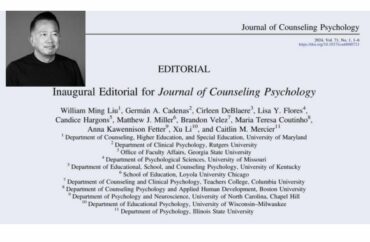
New editors also publish their positionality statements
Submissions to the Journal of Counseling Psychology should not just focus on the effectiveness of cognitive behavioral therapy, the use of pharmaceutical interventions, or how to diagnose mental health conditions – instead, they should also include topics like “anti-Blackness,” “liberation,” and “homophobia.”
This according to the new editors of the American Psychological Association journal.
University of Maryland Professor William Liu is the new chief editor and shared he is “the first person of Color to serve in this prestigious role,” since the journal started in 1954.
“I came to this role because of the dedication and spirit of so many Black, Indigenous, Latine/x, Asian, and other non-Black scholars and practitioners of Color who sought to create a more just and humanizing science and profession and transformed counseling psychology,” he (pictured) wrote.
He thanked the researchers, clinicians, and scholars who “demanded that psychology acknowledge the embeddedness of white supremacy and anti-Blackness, and the ways that systematic, cultural, historical, and institutional mechanisms excluded, erased, and demeaned their ontoepistemologies, lived experiences, and aspirations.”
This same approach to psychology should be reflected in submitted papers, according to Liu and the editorial team.
In addition to “empowering people to improve their lives and promoting psychological functioning and resilience,” psychology should also center “marginalized voices” and address “systemic oppression” and eliminate “health inequities.”
Authors are invited to submit papers that focus on topics such as climate change and its intersection with “systemic racism.”
Racism, according to the editors, contributes to the demand for mental health services.
The editorial stated:
Moreover, systemic racism, anti-Blackness, xenophobia, antiimmigrant hate, white supremacy, homophobia, sexism, dispossession and dislocation, and classism and inequities are also deeply entrenched in our institutions, culture, and people. We encourage authors to reflect on these problems, explore and work with communities that are most affected, and develop solutions and multilevel interventions that heal. It is simply not enough to propose only individual solutions; rather, we must investigate ways that systems and institutions may also be leveraged.
Concepts and theories like liberation, decoloniality, decolonizing, white supremacy, systemic racism, anti-Blackness, anti-Indigeneity, heterosexism, transphobia, injustice, inequities, and classism are instrumental to counseling psychology research and its relevance to our multiply diverse communities.
The editors then included their “positionality,” an exercise where every conceivable characteristic is pronounced.
MORE: Psychologist pushes back against politicized therapy
Liu is “an Asian American (Chinese) cisgender, heterosexual-identified, first-generation student in higher education” who uses “he/him” pronouns. His “partner is an Asian American (Vietnamese and Filipino) woman and critical educator of Color, with whom I collaborate on interrogations of white supremacy, systemic racism, and anti-Blackness.”
Associate Editor Germán Cadenas, a Rutgers University professor, shared his background:
I identify as a formerly undocumented immigrant from Latin America who experiences racial privilege as a white-presenting person of mixed racial ancestry, gender privilege as a cisgender man, and a survivor of poverty who now has access to middle class privilege. I am also a parent of a joyful toddler and happily married to a Jewish woman who descended from a Holocaust survivor.
My critical consciousness was awakened as a young person living through and witnessing oppression at the intersection of anti-immigrant xenophobia, racism, sexism, heterosexism, political unrest, and economic hardship that impacted my wellbeing and that of the people I care
about.
Illinois State University Professor Caitlin Mercier wants to work for “interspecies liberation.” She is a “cis-gender, queer, nonreligious, Black American woman and vegan with working class and first-generation background.”
There are in total 11 editors for the journal that aims to confront “whiteness.”
The publication also “welcome[s] research efforts on marginalized groups that are grounded in critical
and non-Eurocentric paradigms (e.g., Afrocentric and Indigenous paradigms).”
“We look forward to working with our communities as we transform our scholarship.”
MORE: Art therapy needs ‘decolonization,’ paper argues
IMAGE: Journal of Counseling Psychology; William Liu/Twitter
Like The College Fix on Facebook / Follow us on Twitter







Please join the conversation about our stories on Facebook, Twitter, Instagram, Reddit, MeWe, Rumble, Gab, Minds and Gettr.